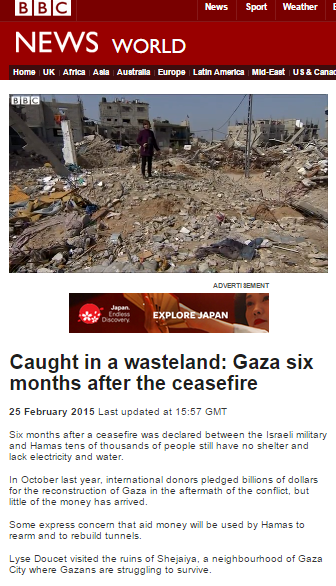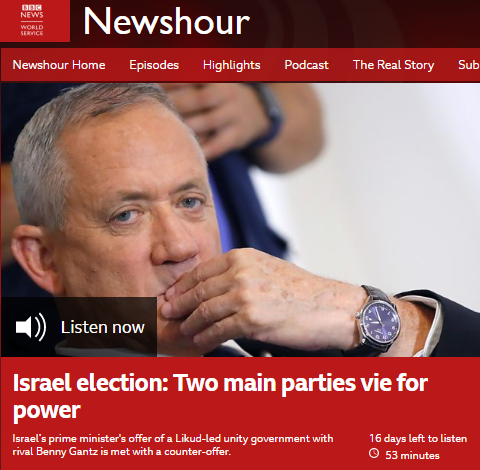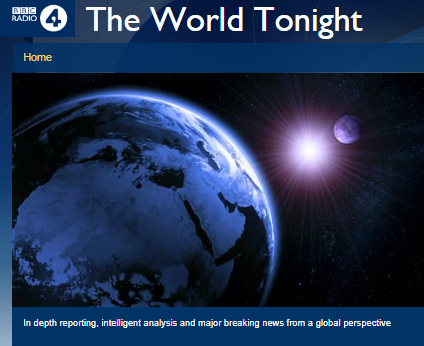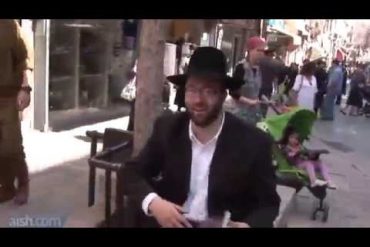Lyse Doucet’s second filmed report from the Gaza Strip (the first was discussed here) seen by viewers of BBC television news on February 25th took the now well-worn ‘reporter in the rubble’ theme to its logical conclusion by having Doucet deliver a two and a half-minute monologue while standing on a pile of earth, metal and concrete in Shuja’iya.
The report also appeared on the BBC News website’s Middle East page where it was titled “Caught in a wasteland: Gaza six months after the ceasefire“.
“Gazans, the international community, certainly didn’t expect Gaza to look like this. Six months ago there was a welcome, there was a celebration among Gazans, among Israelis – particularly in southern Israel – that a ceasefire had been reached. But look at this now. It’s like a wasteland. You could be forgiven for thinking there’d been a natural disaster here.”
Whilst Doucet made copious use of those ‘wasteland’ and ‘natural disaster’ themes in all of her latest reporting from the Gaza Strip, at no point did she bother to try to put the scenes of destruction she promoted so enthusiastically on radio, television and social media into their correct context. BBC audiences were not informed that the scenes from the neighbourhood of Shuja’iya upon which her reports focused are not representative of the situation in the entire Gaza Strip.
That same practice was already in evidence six months ago when BBC reporters likewise nudged audiences towards the mistaken belief that the isolated images of structural damage which had been selected to appear in BBC reports reflected the situation as a whole. Doucet continues:
“But this was the result of 51 days of war as Israeli forces entered on the ground and carried out airstrikes and artillery fire looking for the network of underground tunnels in what they had described as a Hamas stronghold.”
As we see, Doucet is still unwilling to tell audiences the facts about Shuja’iya without ‘Israel says’ style qualification. She goes on:
“But there was a huge human cost as well. And today you can see behind me, in the shell of that home, there’s one pneumatic drill hard at work. In most neighbourhoods we go to we see one digger, one drill. It’s not enough. And just take a closer look at these mounds of slabs of concrete and twisted wires: the white signs that have been posted. Each sign says…gives a description of what stood there once – you can hard….you don’t know what it is now – what stood there, which family lost it and a telephone number to call when aid is going to arrive.
But unfortunately, a lot of the aid hasn’t arrived. And so people – you see clothing lines – people are living in what’s left of their houses and here – right across this crossing here – we’ve been seeing a man in the window of his home, waiting every day, hoping against hope that someone – the United Nations, the Palestinian authorities – someone will come to deliver money.”
Whether or not there is any substance to Doucet’s pathos filled suppositions about a man viewers do not hear or see, we do not know. She continues with more use of the famous ‘Israel says’ formula, which BBC audiences have been very well trained to interpret as actually meaning ‘the BBC refuses to take a position on whether or not this is true’.
“Now, Israel says it has allowed some construction materials in.”
But, as we noted in our previous post:
“In January 2015 alone, 15,205 tons of construction materials were imported into the Gaza Strip. Since the end of the conflict, 50,000 tons of building materials have entered the Strip and more than 42,000 residents have purchased them.”
There was, therefore, no reason whatsoever for Doucet to use the ‘Israel says’ formula here. She could have easily verified the exact amounts of construction materials which have been imported into the Gaza Strip over the last six months and informed her viewers accurately and impartially on that topic. Significantly, she chose not to do that. Doucet’s monologue goes on:
“The international community – the UN – says some donors have been generous and given some aid.”
Once again, Doucet avoids providing audiences with factual information about the factors which have caused other donors to be less forthcoming and instead opts for dramatic and emotive generalisations.
“But look at the scale of this. The United Nations in the summer said that nearly 20,000 homes and schools were completely destroyed. There’s not enough aid and construction materials to rebuild these homes and certainly not enough to rebuild lives. But in Gaza nothing is ever simple. They’re caught in the politics of disunity between Hamas and the Palestinian authority. Caught in the ongoing conflict with Israel, tensions with Egypt which also keeps its border shut. The appeal of Gazans today to the aid agencies is don’t let the people suffer because of the politics.”
So far we have looked at three reports from Shuja’iya put out by Lyse Doucet in the last few days. All of those reports were lacking in detailed, factual information which would help BBC audiences to understand why reconstruction in Gaza is happening so slowly or to appreciate what has been done so far. All three reports placed the focus on emotive, generalized, over-dramatic, context-free descriptions more suited to a telethon appeal than to contributing to viewers’ or listeners’ fact-based knowledge and one report was replete with Hamas propaganda. The bottom line of all these reports is that Doucet avoided adequately explaining to BBC audiences that the reconstruction of housing in the Gaza Strip has been hampered primarily by the Palestinians themselves.
Lyse Doucet is not some rookie reporter or even a local bureau staffer: she is the chief international correspondent of the world’s biggest media organization. The fact that she appears to believe that reports of this mediocre quality contribute anything to fulfilling the BBC’s obligations to its funding public should be cause for considerable concern.
Related Articles:
BBC’s Lyse Doucet does ‘reporter in the rubble’ redux – part one
BBC’s Lyse Doucet does ‘reporter in the rubble’ redux – part two




